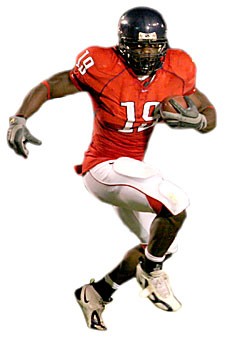Combine results factor into success on Sundays
Does the general public put too much stock in the NFL Combine? Yes. But do NFL teams? Absolutely not.
It’s become somewhat of an overhyped spectacle of late, with all the coverage the Indianapolis event got this year (the NFL Network has aired what seemed like every minute of the event live for the past two years, and has been replaying this year’s action all week), but the fact of the matter is that it’s a centralized event that allows all 32 NFL teams to take a look at draft prospects all in one place.
Besides, looking at last year’s top performers, it’s hard to argue there’s not a connection between results in the combine and on the field.
Is it a coincidence the top-two running backs in terms of 40-yard dash times last year (Maurice Drew, 4.39 and Joseph Addai, 4.40) ended up one-two in rookie rushing?
Drew, a standout at the 2006 combine, made a huge case for offensive rookie of the year last season, leading all rookies with 16 total touchdowns, rushing for 941 yards, and also catching 46 balls for 436 yards.
Or consider the Chicago Bears’ Mark Anderson, who led all rookies with 12 sacks last season. At the 2006 combine he had a 42-inch vertical (which led all defensive lineman), ran a 4.61 40-yard dash (tied for third), ran a 6.95 in the three-cone drill (second) and had a 10-foot-7 broad jump (second).
Former Western Michigan wideout Greg Jennings ran a 4.42 40 at the combine, top-10 among wideouts, then emerged as one of Brett Farve’s targets on the Green Bay Packers, catching 45 passes – three for touchdowns – for 632 yards, both of which were top-five among rookies.
Does a good combine necessarily translate into a standout rookie season? No, nor does a terrible combine mean a player can’t play. But teams would be stupid to ignore the combine results and rely simply on individual workouts if not for any other reason than the combine demonstrates how the athletes perform under pressure.
Is the NFL combine important to teams? Absolutely. But unlike the general public, the teams realize that it’s simply one of many tools used in evaluating a pre-draft player.
– Ryan Casey, assistant sports editor
‘Workout Warriors’ often busts in NFL
So, I flipped on my TV the other day, turned it to the NFL Network and lo and behold, all I see is combine, combine and, yes, more combine.
When last season’s NFL rookie of the year and No. 3 pick in the 2006 draft, Vince Young, didn’t even participate in the workouts, it may have been an indication the whole thing is really not that big a deal.
Others who chose not to participate in this year’s combine include Heisman finalist Brady Quinn of Notre Dame and Louisiana State quarterback JaMarcus Russell. Heisman trophy winner Troy Smith elected not to participate in most drills.
Some NFL analysts will tell you a good combine translates to a good rookie year, but take a look at Saints’ wide receiver Marques Colston, who ran a 4.55 in the 40, had a 10-foot-3-inch broad jump and ran a 11.27 60-yard shuffle last year.
Colston was also the fourth-to-last pick in the draft before he had eight touchdowns and 1,038 yards to lead all rookies to go along with 70 catches, which ranked second to Saints teammate Reggie Bush.
Heading into this season, former Wildcat running back Chris Henry had only 311 career yards with two touchdowns, and this season he averaged a mere 3.5 yards per carry.
On Sunday, Henry ran a 4.40 in the 40 to lead his position and ranked first in the vertical leap with 36 inches.
Now, NFL coaches are rethinking Henry despite his mediocre play during his career at Arizona.
Henry has been dubbed the combine’s “”Workout Warrior,”” a title that went to former Boston College defensive end Mike Mamula in 1995. Mamula was the seventh overall pick by the Eagles that year, but his career didn’t exactly match his workout performance, and he was out of football by 2000.
Other notable recipients of the title included Ashlee Lelie, Kyle Boller and Donte Stallworth – all of who have done little to nothing in the league.
Even Mike Nolan, the 49ers’ head coach, said in a press conference the major aspect of the combine his coaching staff pays attention to is the medical portion.
It’s not surprising that the NFL tries to blow this event out of proportion, but is it really necessary?
I thought there was a reason for scouts, but I could be wrong.
– Melissa Krueger, assistant sports editor









